- Home
- Margaret Brownley
Four Weddings and a Kiss Page 9
Four Weddings and a Kiss Read online
Page 9
The door in the rear of the building opened. Jack expected to see Roland Everton, but it was Molly who came through the doorway. She looked very different from the young woman he’d sat across from on Friday night and the one he’d joined in the pew at church yesterday. This Molly wore a plain, dark blue dress. No fancy flounces or bustles. And though he was no expert on such things, no tight corset beneath either. Her hair was pulled back from her face and captured in a bun at the nape. Simple. Practical. No-nonsense.
She didn’t smile when she saw him. “Good morning, Mr. Ludgrove.” There wasn’t any warmth in her tone either.
Indifference at best, but he suspected her feelings were stronger than that. Why did she dislike him?
“Father will be along shortly,” she said as she reached for an apron and tied it around her waist.
Jack walked toward her, skirting the Washington handpress. “Perhaps we could use this time for you to tell me about your column, Miss Everton.”
“It might be easier for you to just read some of my older ones.”
“Oh, I will do that. But I’d like to know what made you want to write for the newspaper.”
There was a challenging light in her eyes. “Do you think such employment is unsuitable for a woman?”
“Not at all.” Well, maybe a little.
“The world is changing, Mr. Ludgrove, as is a woman’s place in it. The suffrage amendment introduced by Senator Sargent in January of last year may have been defeated, as it was again this year, but one day it—or an amendment like it—will pass. One day women will have the right to vote. We will have the right to control our own properties and our own destinies as well. We will no longer be subject to the whims of our fathers, our brothers, or our husbands, no matter our age.”
“Believe it or not, Miss Everton, I agree with you.”
Her eyes widened. “You do?”
“Yes.” He was in earnest and hoped she knew it.
“Not many men agree.”
“Perhaps not.”
Molly drew herself up, her back stiff as a rail, her surprise obviously forgotten. “No perhaps about it. Most men believe women haven’t the intelligence to do anything other than cook, clean house, and raise children.” The light in her eyes had become a passionate fire. “But I assure you, give us the same opportunities for education and we can do most anything a man can do. We have just as much value in God’s eyes. We are weaker vessels only in our physical bodies.”
“Different but equal.” He smiled. He couldn’t help it. Molly Everton amused him.
The sentiment was not returned. She made a funny little sound in her throat as she whirled away and marched toward the front office.
Jack might have followed, but the door in the back of the building opened a second time, admitting his employer.
Roland grinned. “Good morning, Mr. Ludgrove.”
“Good morning, sir.”
“I trust you are ready to begin.” He hung his hat on a peg on the wall.
“I am, indeed.”
“Then come with me. I’m afraid all three of the offices up front are cramped, but they do afford us some privacy and quiet when we need it.” Like his daughter before him, Roland headed for the front of the building.
Jack followed, a sense of excitement thrumming in his chest.
Molly seethed as she sat at her desk, trying to decide what to write for her next column. She couldn’t think of anything except Jack Ludgrove’s smile. And the more she thought about his smile, the madder she got. Was it any wonder? He’d tried to placate her with words while at the same time laughing at her. Oh, he hadn’t laughed out loud, but he’d been laughing at her all the same.
“Believe it or not, Miss Everton, I agree with you.”
She didn’t believe him. How could she? Even her father thought she was too outspoken for her own good. He wanted her to keep her ideas to herself. Father and Mother said she put men off with her progressive ideas.
But was she really different from most other women? Didn’t they all want to be heard? To be valued for who they were? To be able to speak freely, at least with the people most important to them? But even when a young woman obtained a higher education, she usually found herself back in her parents’ home again, expected to sit and wait for a young man to come along, propose, and make her life mean something. It ought not to be that way.
Molly believed life should be lived to the fullest, and that included engaging her mind. Marrying and having children shouldn’t preclude intelligent thought. A husband and wife should inspire and encourage each other, like iron sharpening iron.
If only . . .
She gave her head a determined shake. Those two words never improved a situation. Never. And besides, she had a column to write.
She took the pencil in her right hand, suddenly remembering what she wanted to write about. The matter of fire safety had been uppermost in her thoughts for quite some time. She’d read a survey that stated fire hazards in US theaters caused one in every four such establishments to burn down within four years of erection. The average life of a playhouse in the country was a mere twelve years. Gas lighting, flammable scenery, and too few exits combined to make theatergoing risky entertainment. On a visit to a concert hall in Cheyenne this past spring, Molly had confirmed the dangers with a little poking around prior to the start of the play. It had left her nervous throughout the entire production.
She scrawled a few words across the top of the paper on her desk, paused and worried her lower lip, then began to write in earnest, letting the words come as they would in this first draft. On the second time through, she would pay more attention to grammar and structure, but now her goal was simply to get the words on paper. When she was still a child, her father had told her many times that words in her head couldn’t be fixed. “Get it down, Molly. Write first. Edit later.”
Finally, the article written, the words in her head spent, she set down the pencil and leaned back in her chair with a sigh. Her eyes lifted to the open door of the tiny room she called an office. On the opposite side of the building, she saw her father seated at his desk and Jack Ludgrove standing near him. Both of them were looking at papers on the desktop.
It wasn’t fair. She deserved to be the new editor of the Sentinel. She’d earned the right to it. True, this was a man’s business. There were a number of women columnists employed at newspapers around the country, usually of the housekeeping variety. Only a few became reporters of real news. Even fewer advanced to a position like managing editor.
But I should have been one of them.
She swiveled her chair to the side and rose. A glance at the clock on the bookcase told her close to two hours had passed. No wonder she felt stiff. When she was writing, she often forgot to get up, move around, stretch—and she paid for it later.
Jack Ludgrove came out of her father’s office at the same moment she stepped through her doorway. With a nod, he walked toward her. “Your father tells me you are at work on your column.”
Oooh. Hearing him say that made her teeth ache. “Yes. My columns are due on Tuesdays. Unless, of course, you decide to change the schedule.”
“I don’t intend to change the schedule or anything else about the paper. At least not anytime soon.”
“You should get to know the town and our readers.”
“Excellent idea, Miss Everton. Perhaps you would be good enough to take me on a brief tour of Killdeer. I met quite a number of folks in church yesterday, but there is more to see and there are more people to meet.”
“I really should finish my column.”
“But you’ve been at it for a long while. A bit of fresh air would do you good. It would do us both good. Exercise clears the mind.” He motioned with one hand toward the front door. “Please.”
What could she do but agree to his request? He was, after all, her new boss.
Jack was about to offer his arm to Molly, but she moved toward the door before he could. He had no choice but to follo
w. She didn’t wait for him to open it either. He had to quicken his steps to catch up with her on the boardwalk.
Molly looked one way up Main Street and down the other. “As you can see, Killdeer is laid out in a nice square. No winding roads for our town planners.” She turned right and started walking. “Killdeer was nothing but a trading post for many years. The wagon trains that followed the Oregon Trail went south of here thirty years ago, but folks who wanted to head northwest into Idaho Territory could take this cutoff. Some chose to settle in these valleys. And now the railroad plans to bring a spur through this way too. Father says it will take a good five years for the entire length of it to be completed, but it will happen. And when it reaches us, Killdeer will grow. It’s doubtful our town will ever become a real city, but we will be large enough to prosper.”
Jack enjoyed watching her as she spoke. Her love for this place was obvious in her expression as well as in the tone of her voice.
“The nation’s first national park, as I’m sure you know, is to the north. Not quite two hundred miles from us. Some Yellowstone visitors come through Killdeer on their way to see Old Faithful. And there is Bear Lake over the mountains to the west of here.”
All very interesting, but Jack wanted to know more about Molly and her family. “And what brought the Evertons to Killdeer?”
She stopped walking and looked at him, eyes narrowing, as if trying to decide whether to answer his question. She must have decided in his favor.
“Our lives were very different after the war.” She gave a slight shrug. “The town we lived in was hit hard. So many young men of our acquaintance died, my cousin among them.”
“I lost two brothers in battle.”
She was silent for a moment, then said, “I’m sorry, Mr. Ludgrove. I know the pain of loss.”
He acknowledged her words with a nod.
“Then you understand why it became so difficult for us to stay where we were. Father wanted to move away from the heartache. He longed for a fresh start where we wouldn’t have reminders of the war, so he looked for a town out west in need of a newspaper, and this is where we came.”
Jack wondered if Molly had also lost a young man in the war, someone she might have married if he hadn’t died. If Jack had guessed her age right, she would have been around sixteen or seventeen at the start of the Civil War. But he couldn’t ask what he wondered, so instead he cleared his throat and asked her to tell him about the businesses that lined Main Street.
As she answered, they walked again, the pace leisurely. When they met someone on the street—man or woman—Molly and Jack stopped and she introduced him. She always added something kind about the other person in her introduction. Mrs. Perkins made the best pies. Mr. Ingram was an expert watchmaker.
Jack wondered what townsfolk would say to him about Molly Everton if given the chance. And what was wrong with the men of Killdeer, Wyoming, that one of them hadn’t snagged her for his bride in the decade she’d lived here? Weren’t women in short supply out west? That was what he’d heard.
Eventually, their circuitous route about town brought them to the livery.
“Do you know anything about horses, Miss Everton?” Jack asked, not waiting for an answer before he said, “Would you mind looking at some with me?”
“If you like.”
They moved into the cooler interior of the barn.
“Mr. Whitaker?” Jack called.
“Be right with you,” came a reply from the darker recesses. The blacksmith was true to his word. He appeared less than a minute later, wiping hands on his leather apron. “Ah, Mr. Ludgrove. You came.” He grinned at Molly. “Howdy, Miss Everton. You must be showing your new boss about town. Is that it?”
Despite the distance between them, Jack felt Molly stiffen.
“Saw you together at church yesterday.” George Whitaker’s grin broadened.
Jack hadn’t known Molly more than a few days, but he knew the blacksmith’s comment would not sit well with her.
Almost too softly for Jack to hear, she whispered, “His wit’s as thick as Tewksbury mustard.”
What was she talking about? He wanted to ask her to repeat it, but he was convinced her words had been meant for herself alone.
George Whitaker said, “I reckon you want to see the horses I got for sale. Follow me. They’re out back.”
Jack waited until Molly started forward, then he brought up the rear. When she stepped outside again, the light formed a kind of halo around her.
Halo? Why was that the first word to come to his mind? Miss Everton didn’t strike him as the angelic type. Pleasant. Attractive. But definitely not angelic. He cleared his throat, as if doing so would clear his thoughts as well. Then he quickened his stride, hurrying to catch up with the blacksmith.
He was here to buy a horse, after all. Not gaze at his employer’s daughter.
CHAPTER FIVE
THE FIRST EDITION OF THE KILLDEER SENTINEL WITH JACK Ludgrove as its managing editor came out that Friday. The Sentinel wasn’t a large paper—just one sheet folded in half to make four printed pages. While almost half of the space was taken up with advertising, there was a good deal of local, national, and world news included.
Molly Everton’s column, “Killdeer Corner,” was on the second page.
Jack had been pleasantly surprised when he read her article for the first time. Her prose wasn’t florid or vapid as was true of some female writers. And the column wasn’t a place for gossip or the sharing of banal personal thoughts, as he’d feared it might be. It was solid and interesting. Almost good enough to be a front-page news item.
Molly knew the who, what, when, where, and why of modern-day news gathering. She had her supporting information, key quotes, and background information. Jack was so impressed that he decided the next time he attended a theater, he would make certain he got a seat close to an exit.
Roland Everton appeared in the doorway to Jack’s office. “Time to call it a day. We close early on Fridays.”
“I guess you told me that. I forgot.” He folded the newspaper and placed it on his desk. As he rose from his chair, he said, “You won’t have to remind me again.”
“Mrs. Everton wondered if you might come for Sunday dinner.”
“That’s very kind. But I was a guest only a week ago.” He rounded his desk, heading toward the door. “Wouldn’t want to wear out my welcome.”
Roland clapped him on the shoulder. “Nonsense. We wouldn’t have asked if we didn’t want you.”
“Well then. I suppose it would be rude to refuse.”
“That it would. Besides, you won’t be the only guest. My wife likes to have folks over regular for Sunday dinner.”
The two men left the building through the back door, Roland locking it behind them. Jack waited until his employer was in his buggy, then he waved and started toward the boardinghouse. But after only a few steps, he stopped and turned in a different direction. Toward the livery where he boarded the horse he’d purchased from the blacksmith the previous Monday.
George Whitaker was busy at the forge and no one else was around, so Jack was able to saddle and bridle the black gelding without interruption. When he was done, he removed his suit coat and draped it over the stall door. After rolling up his shirtsleeves, he stepped into the saddle and rode out of the barn.
He followed the road north, first at a slow trot, then a canter. The horse had an easy gait and Jack felt free to look around, noting the passing countryside. There were a number of smaller farms closer to town. Eventually it became more difficult to tell how much land belonged to one owner. There were fewer crops and more cattle. Occasionally a house was easy to see from the road. Other houses, he supposed, were far from the main road or hidden by trees and rolling landscape. And some of the land had to be open range, belonging to no one.
The afternoon was hot and Jack took pity on his horse, reining him to a walk. To the east he saw evidence of a water source—a copse of trees peeking up from a gully. He t
urned the gelding in that direction. When they came over the rise, they were greeted with the sight of a creek, the water as clear as glass. Horse and rider went down the incline and into the welcome shade of the poplars growing along the banks of the stream. After getting a drink, Jack splashed some cool water onto his face and the back of his neck, then he stood back and breathed deeply.
Pleasure washed over him. A sense of rightness. He belonged here. He felt it in his bones. He’d waited several years to see his dreams of the West realized, and he was grateful not to have been disappointed by reality.
Molly Everton’s voice played in his memory: “Then I don’t suppose you plan to stay long in Killdeer.”
He chuckled. Something he hadn’t been able to do the night she’d said those words to him. Maybe, when it was time for him to move on, he would tell her father she should be named editor. From what he’d observed thus far, she was qualified, and it hadn’t been difficult for him to come to understand she wanted that title.
But he wouldn’t be leaving anytime soon. Molly Everton would have to wait for her heart’s desire, just as he’d had to wait.
Molly added some canned peaches to her shopping basket, the last of the items on her mother’s list. She turned from the shelves on the wall at the same moment the bell above the mercantile door announced the arrival of more customers. She glanced to see who it was.
Jane and Ada Shoemaker. They smiled and giggled, then hurried toward Molly.
Jane said, “Good afternoon, Miss Everton.”
“Jane. Ada.” She could not bring herself to call them by their surnames. She’d looked after them more than once when she was in her midtwenties and they were little girls in braids. In her mind, they were little girls still.
“We were so excited to read the newspaper when Papa was finished with it this morning. Weren’t we, Ada? Mr. Ludgrove’s editorial was wonderful.”

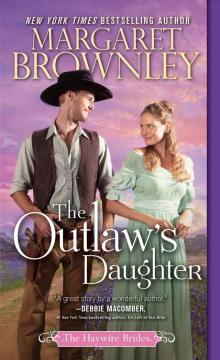 The Outlaw's Daughter
The Outlaw's Daughter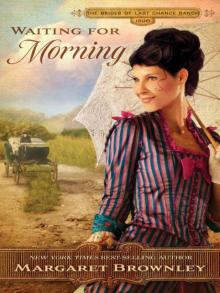 Waiting for Morning (The Brides Of Last Chance Ranch Series)
Waiting for Morning (The Brides Of Last Chance Ranch Series) Do You Hear What I Hear?
Do You Hear What I Hear?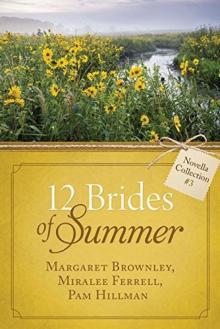 The 12 Brides of Summer Novella Collection #3
The 12 Brides of Summer Novella Collection #3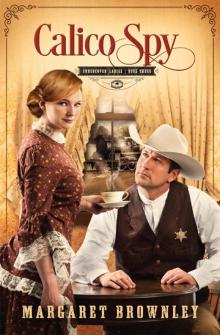 Calico Spy
Calico Spy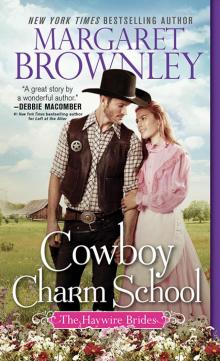 Cowboy Charm School
Cowboy Charm School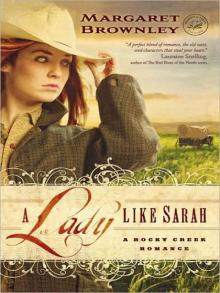 A Lady Like Sarah
A Lady Like Sarah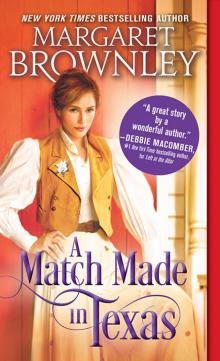 A Match Made in Texas
A Match Made in Texas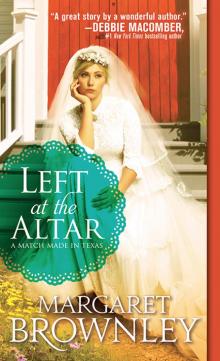 Left at the Altar
Left at the Altar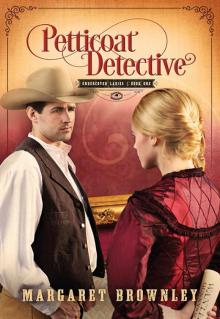 Petticoat Detective
Petticoat Detective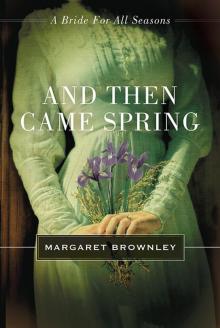 And Then Came Spring
And Then Came Spring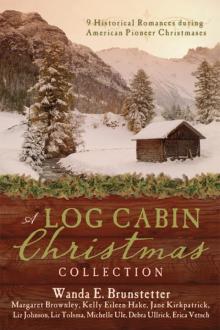 Log Cabin Christmas
Log Cabin Christmas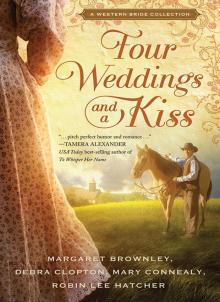 Four Weddings and a Kiss
Four Weddings and a Kiss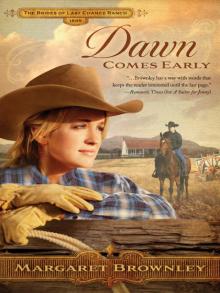 Dawn Comes Early
Dawn Comes Early